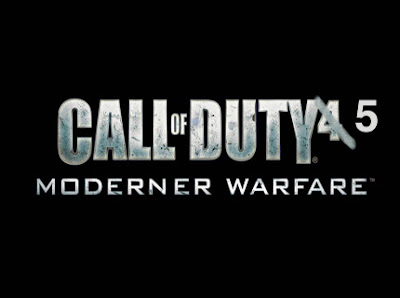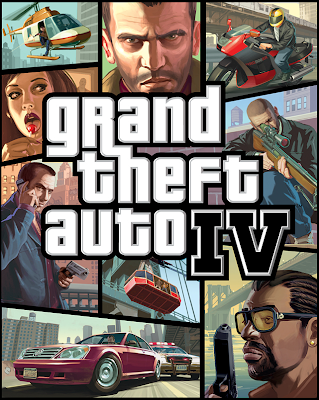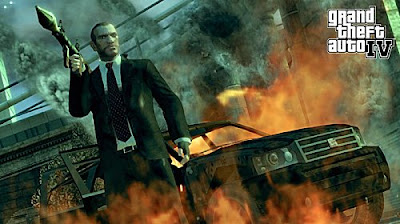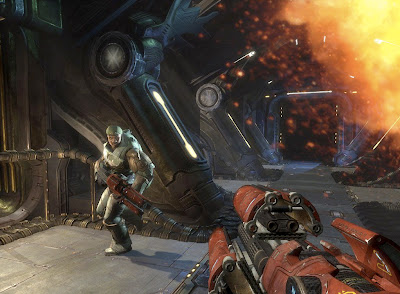skip to main |
skip to sidebar
 Activision is well on its way to becoming the top publisher in the industry with its impending merger with Blizzard. As profits soar, so does the demand for high growth. To achieve this growth their shareholders and management desire, current profitable titles and the opportunities attached with high profile franchises must be aggressively capitalized on, but at what price?Activision has declared a couple of months back their planned yearly product cycle for Guitar Hero and Call of Duty franchises. Both titles significantly adding to share values and profitability of the business for the past couple of years.Regrettably, minor and even major updates can only last so long. Innovation can get stagnant after years of innovation on gameplay design and as well as people's susceptibility in purchasing an annual copy of the game.Check the NBA Live brand... (source: Metacritic)
Activision is well on its way to becoming the top publisher in the industry with its impending merger with Blizzard. As profits soar, so does the demand for high growth. To achieve this growth their shareholders and management desire, current profitable titles and the opportunities attached with high profile franchises must be aggressively capitalized on, but at what price?Activision has declared a couple of months back their planned yearly product cycle for Guitar Hero and Call of Duty franchises. Both titles significantly adding to share values and profitability of the business for the past couple of years.Regrettably, minor and even major updates can only last so long. Innovation can get stagnant after years of innovation on gameplay design and as well as people's susceptibility in purchasing an annual copy of the game.Check the NBA Live brand... (source: Metacritic) So from 2003, it was known and critiqued as an above average game -- it sustained those scores for the next 2 years, sadly for the franchise, it's been publicly known as a consistent mediocre game since ‘06 till ‘08. And sales obviously went down from there.Although this could be a case of it being just a ‘basketball game’ -- innovative freedom would be limited, however, possibilities to enhance gameplay and features are achievable although minor.Releasing a game with the same Title then a different subtitle is a bit of an overkill and inherently redundant. Take for example, Ubisoft’s Splinter Cell franchise, in the end, they had to revamp its whole approach on game design - they saturated the brand during the last gen, numerous ‘updates’ on mostly a year or two intervals. The fifth iteration is a perfect example of studios realizing brand saturation -- a complete overhaul on game mechanics and design.The value of the brand diminishes overtime. Call of Duty so far has done a great job reinventing itself, if COD4 came out with another WW2 setting? Predicted market reaction: Not another WW2 shooter...Infinity Ward was pushed to innovate, they were developing the game (COD4) since late 2005. This proves, that they knew the overused and overdone WW2 FPS setting. And a game design overhaul was due.Which gives reason to Infinity Wards’ demand for exclusive development rights from their umbrella company. They see the profit based approach their owners are implementing to the franchise. And directly and indirectly slowly diminishes the brand’s value and marketability.Guitar Hero and COD are great franchises, and so far Activision has been able to deliver each version with bigger and better gameplay, but 3 to 5 years from now there's a high possibility that it'd reach its grand creative limit and the way consumers will view those franchises would be of familiarity and fatigue.
So from 2003, it was known and critiqued as an above average game -- it sustained those scores for the next 2 years, sadly for the franchise, it's been publicly known as a consistent mediocre game since ‘06 till ‘08. And sales obviously went down from there.Although this could be a case of it being just a ‘basketball game’ -- innovative freedom would be limited, however, possibilities to enhance gameplay and features are achievable although minor.Releasing a game with the same Title then a different subtitle is a bit of an overkill and inherently redundant. Take for example, Ubisoft’s Splinter Cell franchise, in the end, they had to revamp its whole approach on game design - they saturated the brand during the last gen, numerous ‘updates’ on mostly a year or two intervals. The fifth iteration is a perfect example of studios realizing brand saturation -- a complete overhaul on game mechanics and design.The value of the brand diminishes overtime. Call of Duty so far has done a great job reinventing itself, if COD4 came out with another WW2 setting? Predicted market reaction: Not another WW2 shooter...Infinity Ward was pushed to innovate, they were developing the game (COD4) since late 2005. This proves, that they knew the overused and overdone WW2 FPS setting. And a game design overhaul was due.Which gives reason to Infinity Wards’ demand for exclusive development rights from their umbrella company. They see the profit based approach their owners are implementing to the franchise. And directly and indirectly slowly diminishes the brand’s value and marketability.Guitar Hero and COD are great franchises, and so far Activision has been able to deliver each version with bigger and better gameplay, but 3 to 5 years from now there's a high possibility that it'd reach its grand creative limit and the way consumers will view those franchises would be of familiarity and fatigue.
 Oh yes the Wii, WiiFit’s upcoming release to the masses of casual gamers to which Nintendo has so successfully seduced -- all this casual and non-traditional trends in videogames as of late have been quite a harbinger of the how the publishers and developers might shift to a new set of consumers entirely brushing off the core market which practically and statistically speaking is the source of all those billions and billions of revenues.Uhh, Not quite.
Oh yes the Wii, WiiFit’s upcoming release to the masses of casual gamers to which Nintendo has so successfully seduced -- all this casual and non-traditional trends in videogames as of late have been quite a harbinger of the how the publishers and developers might shift to a new set of consumers entirely brushing off the core market which practically and statistically speaking is the source of all those billions and billions of revenues.Uhh, Not quite. Nintendo has been smart enough to develop the casual market for the first two years and still partially support the hardcore audience, although a rarity in their consistency -- they’re betting on third party developers to fill in the gaps of those first party releases. Now that they’ve proven to be the number one in terms of volume of videogame systems sold, publishers would start to see the immense opportunity to capture these over 20 million Wii owners.The Wii has acquired a ballooning consumer base in a matter of less than 2 years -- less than what Microsoft’s Xbox 360 and PS3 have achieved over their current shelf lifetimes.
Nintendo has been smart enough to develop the casual market for the first two years and still partially support the hardcore audience, although a rarity in their consistency -- they’re betting on third party developers to fill in the gaps of those first party releases. Now that they’ve proven to be the number one in terms of volume of videogame systems sold, publishers would start to see the immense opportunity to capture these over 20 million Wii owners.The Wii has acquired a ballooning consumer base in a matter of less than 2 years -- less than what Microsoft’s Xbox 360 and PS3 have achieved over their current shelf lifetimes. And the filler of the gap for the core? MadWorld - being developed by Platinum, the same talents and creative geniuses of Resident Evil, Okami, and Viewtiful Joe. Slated for a release round Jan to March of 2009 and to be published by the legendary money loosing hardware turned software company, SEGA.So far, based on the screenshots, it’s creative and fresh in terms of aesthetics and violence. Not only is the method of rendering images on screen using a black and white unique, the system for which SEGA is targeting to exclusively develop for is quite surprising. The Wii consumers have proven to be reluctant to be repeat buyers, content with WiiSports and whatever Nintendo bundled their system with...SEGA is betting on a hungry core audience who purchased their Wiis to snatch up this game to satiate their desire for testosterone and blood thirsty gameplay. And inject no holds barred humor - you’ve got a title that can captivate the demographic that as gamers cry out, Nintendo betrayed.SEGA hopes that that would be the case. Although there could be a possible risk that Wii’s consumers, as Microsoft predicts, would have ‘matured’ and moved on to either an Xbox 360 or PS3 - as defined by MS, a deeper and more compelling gaming experience.As the launch of this game draws near for each passing week/month, how the casual market would react to this type of hardcore focused title remains to be seen.
And the filler of the gap for the core? MadWorld - being developed by Platinum, the same talents and creative geniuses of Resident Evil, Okami, and Viewtiful Joe. Slated for a release round Jan to March of 2009 and to be published by the legendary money loosing hardware turned software company, SEGA.So far, based on the screenshots, it’s creative and fresh in terms of aesthetics and violence. Not only is the method of rendering images on screen using a black and white unique, the system for which SEGA is targeting to exclusively develop for is quite surprising. The Wii consumers have proven to be reluctant to be repeat buyers, content with WiiSports and whatever Nintendo bundled their system with...SEGA is betting on a hungry core audience who purchased their Wiis to snatch up this game to satiate their desire for testosterone and blood thirsty gameplay. And inject no holds barred humor - you’ve got a title that can captivate the demographic that as gamers cry out, Nintendo betrayed.SEGA hopes that that would be the case. Although there could be a possible risk that Wii’s consumers, as Microsoft predicts, would have ‘matured’ and moved on to either an Xbox 360 or PS3 - as defined by MS, a deeper and more compelling gaming experience.As the launch of this game draws near for each passing week/month, how the casual market would react to this type of hardcore focused title remains to be seen.
Journalism as it is known, generally anyway, is essentially an unbiased approach on topics and matters featured, discussed, and scrutinized under the media microscope. When readers in this case, I would argue to call them the ‘market’ - since publications either offline or online earn through advertising deals and mostly likely 90% or more of their revenue source stems from these ads. Thus, calling the readers as a market would be logical and most of all, true.Their internal clients largely consists of companies that churns out products or services that caters to the demographic and purchasing taste of the readers. A straightforward approach on how these publications do business and turn a profit: the more readers, the larger the market, the larger the market, the higher the possibility of ‘internal’ clients on buying an ad space within their sites or pages.So, to put it in a nutshell, the silent but imperative objective of journalists as a content provider is to increase and expand the market through content.GTA 4s official release was April 29th, a couple of days prior to the release, IGN.com published an EXCLUSIVE review of the game, thousands read the review within the first few hours. And in a matter of a day or two, hundreds of thousands had visited IGN for the sole reason of reading the review for the biggest game release of the year. The million dollar question is, what was IGN's edge to Rockstar that they became the de-facto gaming site to cover such a high profile game?
When readers in this case, I would argue to call them the ‘market’ - since publications either offline or online earn through advertising deals and mostly likely 90% or more of their revenue source stems from these ads. Thus, calling the readers as a market would be logical and most of all, true.Their internal clients largely consists of companies that churns out products or services that caters to the demographic and purchasing taste of the readers. A straightforward approach on how these publications do business and turn a profit: the more readers, the larger the market, the larger the market, the higher the possibility of ‘internal’ clients on buying an ad space within their sites or pages.So, to put it in a nutshell, the silent but imperative objective of journalists as a content provider is to increase and expand the market through content.GTA 4s official release was April 29th, a couple of days prior to the release, IGN.com published an EXCLUSIVE review of the game, thousands read the review within the first few hours. And in a matter of a day or two, hundreds of thousands had visited IGN for the sole reason of reading the review for the biggest game release of the year. The million dollar question is, what was IGN's edge to Rockstar that they became the de-facto gaming site to cover such a high profile game? Coincidentally, as if the stars suddenly aligned and the big bang reoccurred, IGN gave it a whopping 10 - a perfect mark. Not since the days of yore have they given a game a perfect score - as attested by IGN staff.What clearly disturbs those fascinated with journalistic back alleys is the exclusivity and the surprisingly coincidental perfect mark given by the site -- its irrefutably tainted with an X deal, a quid pro quo, a scratch my back scratch your back milieu.
Coincidentally, as if the stars suddenly aligned and the big bang reoccurred, IGN gave it a whopping 10 - a perfect mark. Not since the days of yore have they given a game a perfect score - as attested by IGN staff.What clearly disturbs those fascinated with journalistic back alleys is the exclusivity and the surprisingly coincidental perfect mark given by the site -- its irrefutably tainted with an X deal, a quid pro quo, a scratch my back scratch your back milieu.  You can’t blame independent journalists from crying foul and arguing this unethical practice. However, even how unfortunate it may be, its the status quo -- and this is not only in the realms of videogame journalism but other industries as well. Thats right, believe it or not, its an accepted industry practice.Disappointing for those who faithfully read reviews and features thinking that their beloved journalists put the readers' welfare first -- that they would, beyond any doubt, conduct a no bullshit, no spin take on product reviews and other journalistic content whatever it may be.Indeed, its disheartening that ethical journalism, as is anything ethical in this world’s simply too few and far between. Accept it and eventually apathy sets in and it’d ‘be another day in paradise’ for all of us. Such is the case of our country, our state, our people -- apparently, we excel too well on our execution.
You can’t blame independent journalists from crying foul and arguing this unethical practice. However, even how unfortunate it may be, its the status quo -- and this is not only in the realms of videogame journalism but other industries as well. Thats right, believe it or not, its an accepted industry practice.Disappointing for those who faithfully read reviews and features thinking that their beloved journalists put the readers' welfare first -- that they would, beyond any doubt, conduct a no bullshit, no spin take on product reviews and other journalistic content whatever it may be.Indeed, its disheartening that ethical journalism, as is anything ethical in this world’s simply too few and far between. Accept it and eventually apathy sets in and it’d ‘be another day in paradise’ for all of us. Such is the case of our country, our state, our people -- apparently, we excel too well on our execution.
Statement: “We are suffering currently from the huge piracy that is encompassing Crysis. We seem to lead the charts in piracy by a large margin, a chart leading that is not desirable. I believe that’s the core problem of PC Gaming, piracy, to the degree [that PC gamers who] pirate games inherently destroy the platform. Similar games on consoles sell factors of 4-5 more. It was a big lesson for us and I believe we won't have PC exclusives as we did with Crysis in future. We are going to support PC, but not exclusive anymore." - Cevat Yerly, co-founder and CEO of CrytekRelated News:Unreal Tournament 3 servers received over 40 million attempts at illegitimate access using pirate keys. That number is huge, and the real magnitude comes when you calculate the retail price of $49.99 (59.99 for Collector's Edition).If those 40 million players actually paid the full price, it would have been nearly $2 billion more in Epic’s pocket book. That is more than the quarterly sales results from Nvidia or AMD. Reaction:Piracy, the bane of multiple entertainment industries, be it music, movie or videogames. Face it, it’s here to stay and can never be alleviated, it can only be minimized and reduced.Although, the chances of curtailing piracy, bleak as it may seem, have improved slightly on the software front for videogame consoles especially for the PS3. However, eventually the system’s firmware would be successfully hacked as more and more consumers own the platform -- translating to a bigger market for copied games but as the videogames industry has proven through the years, its consumers are incredibly loyal and gratuitous with their disposable incomes.On Crytek’s issue, for some reason, they saw no business in developing for the console platforms. These platforms have established markets and have proven to be good business for publishers. The FPS genre nowadays rarely make a splash with PC gamers, and if they do, they are relentlessly copied and shared through P2P networks. Why bother on exerting all your development effort for a platform that assures a higher possibility of piracy? Console piracy exists, yes, nonetheless developers significantly have better chances on realizing sales from a market which has proven to be generous with their gaming purchases.It only makes business sense that Crytek chose to release console versions of the game this packed holiday season. And it doesn't hurt going for a multiplatform approach.
Reaction:Piracy, the bane of multiple entertainment industries, be it music, movie or videogames. Face it, it’s here to stay and can never be alleviated, it can only be minimized and reduced.Although, the chances of curtailing piracy, bleak as it may seem, have improved slightly on the software front for videogame consoles especially for the PS3. However, eventually the system’s firmware would be successfully hacked as more and more consumers own the platform -- translating to a bigger market for copied games but as the videogames industry has proven through the years, its consumers are incredibly loyal and gratuitous with their disposable incomes.On Crytek’s issue, for some reason, they saw no business in developing for the console platforms. These platforms have established markets and have proven to be good business for publishers. The FPS genre nowadays rarely make a splash with PC gamers, and if they do, they are relentlessly copied and shared through P2P networks. Why bother on exerting all your development effort for a platform that assures a higher possibility of piracy? Console piracy exists, yes, nonetheless developers significantly have better chances on realizing sales from a market which has proven to be generous with their gaming purchases.It only makes business sense that Crytek chose to release console versions of the game this packed holiday season. And it doesn't hurt going for a multiplatform approach. As for Epic’s Unreal Tournament 3, as to prove my notion, they gained more sales from the PS3 version than the PC.Although I disagree regarding the figure of lost revenue, in this case, about 2 billion dollars - the 40 million attempts are mainly consumers who are leaning on purchasing copied/illegally downloaded games - the desire and behavior of these consumers ultimately imply that they have no plans on purchasing an original copy of the title. And even if a selective few did have concrete plans on grabbing one, only a minor fraction of the actual figure would have gotten a copy worth 50 dollars.Crytek, learn from Epic. They saw opportunities and the oh-so apparent risks of the PC and console markets, perhaps invest more on your market research efforts. And next time you wouldn’t have to issue press statements publicizing your dismay of consumers who couldn’t care less.
As for Epic’s Unreal Tournament 3, as to prove my notion, they gained more sales from the PS3 version than the PC.Although I disagree regarding the figure of lost revenue, in this case, about 2 billion dollars - the 40 million attempts are mainly consumers who are leaning on purchasing copied/illegally downloaded games - the desire and behavior of these consumers ultimately imply that they have no plans on purchasing an original copy of the title. And even if a selective few did have concrete plans on grabbing one, only a minor fraction of the actual figure would have gotten a copy worth 50 dollars.Crytek, learn from Epic. They saw opportunities and the oh-so apparent risks of the PC and console markets, perhaps invest more on your market research efforts. And next time you wouldn’t have to issue press statements publicizing your dismay of consumers who couldn’t care less.
 Has it been over a decade since Starcraft was released for the PC back in March of ’98? How could a game this deep into its shelf life still be so relevant and religiously played by millions? - Addictive gameplay, great balance for each race, compelling storyline, extreme replayability are the ingredients that made Starcraft what it is today - one of the best games ever created. Its longetivity unquestioned, its mass appeal immensely staggering, its influence unequivocal.Its sequel is upon us, and it will sell by the millions solely in South Korea and millions more from other markets. The franchise has crossed through different segments and demographics, and gamers are expecting nothing short of a fantastic experience in terms of gameplay and the overall entertainment value the final product will offer.
Has it been over a decade since Starcraft was released for the PC back in March of ’98? How could a game this deep into its shelf life still be so relevant and religiously played by millions? - Addictive gameplay, great balance for each race, compelling storyline, extreme replayability are the ingredients that made Starcraft what it is today - one of the best games ever created. Its longetivity unquestioned, its mass appeal immensely staggering, its influence unequivocal.Its sequel is upon us, and it will sell by the millions solely in South Korea and millions more from other markets. The franchise has crossed through different segments and demographics, and gamers are expecting nothing short of a fantastic experience in terms of gameplay and the overall entertainment value the final product will offer. How I long again to frantically click on my mouse to regain my mastery of that cheap shot “10mins Zerg rush” tactic and to feel that exhilarating urge to topple my opponents. It seems so fresh to me the matches I had through a 56kbp modem, incredibly smooth gameplay and drool inducing graphics (at that time indeed it was).Starcraft is one of the reasons I am into gaming, it could very well be the possible savior of an ailing PC industry which has been ruled by online games such as World of Warcraft (note: Blizzard developed as well). I simply can’t wait for this title. It’d be reliving my memories a decade ago and the years in between. Indeed, a trip to memory lane and a peek of what it is to come for the RTS genre.
How I long again to frantically click on my mouse to regain my mastery of that cheap shot “10mins Zerg rush” tactic and to feel that exhilarating urge to topple my opponents. It seems so fresh to me the matches I had through a 56kbp modem, incredibly smooth gameplay and drool inducing graphics (at that time indeed it was).Starcraft is one of the reasons I am into gaming, it could very well be the possible savior of an ailing PC industry which has been ruled by online games such as World of Warcraft (note: Blizzard developed as well). I simply can’t wait for this title. It’d be reliving my memories a decade ago and the years in between. Indeed, a trip to memory lane and a peek of what it is to come for the RTS genre.
 Opinion: Yoshki OkamotoA recent headline caught my attention, the Street Fighter II creator Yoshki Okamoto predicted the resurgence of a videogame market crash similar to 1983 when loads of poorly developed software were released thinking consumers were idiots who’ll let get go of their money to purchase the product for the sole reason it carries a well known franchise - the likes of the infamous E.T. game.It was only until Nintendo came into the picture in the late 80s that gave the market a sudden jolt. However, ironically, Nintendo’s Wii is utilized by ‘casual’ developers now to distribute their poorly developed games according to Okamoto.Reaction:I just don’t see the market crashing anytime soon. The industry has been growing at a consistent rate and even if he argues that Nintendo Wii’s games might cause a slowdown on consumer uptake, he overlooked on the quality of games being released for the other two platforms. Moreover, the diversification of the industry as a whole -- revenue for publishers and developers alike have found new mediums for distribution such as Valve’s Steam and Xbox Live’s Marketplace/Arcade.
Opinion: Yoshki OkamotoA recent headline caught my attention, the Street Fighter II creator Yoshki Okamoto predicted the resurgence of a videogame market crash similar to 1983 when loads of poorly developed software were released thinking consumers were idiots who’ll let get go of their money to purchase the product for the sole reason it carries a well known franchise - the likes of the infamous E.T. game.It was only until Nintendo came into the picture in the late 80s that gave the market a sudden jolt. However, ironically, Nintendo’s Wii is utilized by ‘casual’ developers now to distribute their poorly developed games according to Okamoto.Reaction:I just don’t see the market crashing anytime soon. The industry has been growing at a consistent rate and even if he argues that Nintendo Wii’s games might cause a slowdown on consumer uptake, he overlooked on the quality of games being released for the other two platforms. Moreover, the diversification of the industry as a whole -- revenue for publishers and developers alike have found new mediums for distribution such as Valve’s Steam and Xbox Live’s Marketplace/Arcade. these two could may very well be 'the' cause for the demise of the industry as we know it...
these two could may very well be 'the' cause for the demise of the industry as we know it...
I’m back from hibernation, had a sudden attack of post traumatic stress... needed some sort of therapy after a gripping loss of a gadget very close to my heart. Oh and just to give closure to my well publicized predicament -- inquired from ‘experts’ of X360 clerics, there’s a measly 50-50 chance of survival. A chip issue concerning the system’s display capabilities I think is what caused this historic (for me at least) plight -- quite irrelevant now. Whatever scrap value I can get out of a bricked system, I’m open to it.No entry since that fateful day, had to heal wounds, and please, I was ‘in mourning’. An epiphany struck me a few days back though, GTA 4 was released... goodness, the most anticipated game release of the year and I missed it. How could that be possible?I was desperate, I HAD to take a pill to relive that excitement and enthusiasm in barfing out the thoughts from my convoluted soldered mind (note: ‘precise’ blending of the right and left brain; subnote: no, I am not autistic). What pill you say? A shiny new Macbook Air. Call me a low level superficial notebook consumer, but I’m one happy low level superficial notebook consumer.It is indeed as it was mentioned time and time again, through various reviews, posts and opinions from tech gurus and readers -- the value is in the satisfaction and pleasure of using it. Plus the obvious weight loss, been using a Macbook Pro for the past two years. Carrying a 6 pound notebook for hours on end? Ouch.
What pill you say? A shiny new Macbook Air. Call me a low level superficial notebook consumer, but I’m one happy low level superficial notebook consumer.It is indeed as it was mentioned time and time again, through various reviews, posts and opinions from tech gurus and readers -- the value is in the satisfaction and pleasure of using it. Plus the obvious weight loss, been using a Macbook Pro for the past two years. Carrying a 6 pound notebook for hours on end? Ouch.
Don’t get me wrong, this ain’t a review. No reviews for notebooks here - merely a prologue to my next entry/ies.Two things though before I end this 'prologue': I decided to get another X360 come holiday season, and perhaps save up for a new setup before end of year. Guess playing videogames can be quite seasonal, but gaming news goes on and that I’ll surely do for the following months.Again, much thanks for visiting and reading a completely unknown videogame blogger’s work/s.




















